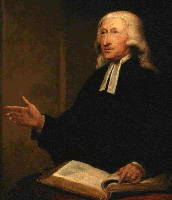A Pentecostal Season: The Methodists in England and America, Part 1
Thomas Walsh, a friend and colleague of Wesley wrote in his journal February 24, 1751, “The influence of His Spirit wrought so powerfully upon me, that my joy was beyond expression.” In his journal on March 8, 1751 he writes, “This morning the Lord gave me a language I knew not of, raising my soul to Him in a wonderful manner.”[21]
In his writings, Wesley testified to a belief in demons and spiritual warfare. He believed in and experienced miraculous healings. He believed in the gift of prophecy, visions and dreams. He testified to the ministry of angels.

John Wesley preaching
In his sermon “On Divine Providence” (written in 1784), Wesley writes “Admitting then that, in the common course of nature, God does act by general laws, he has never precluded himself from making exceptions to them, whensoever he pleases; either by suspending that law in favour of those that love him. Or by employing his mighty angels: By either of which means he can deliver out of all danger them that trust in him. ‘What! You expect miracles then?’ Certainly I do, if I believe the Bible: For the Bible teaches me, that God hears and answers prayer: But every answer to prayer is, properly, a miracle.”[22]
As late as 1856, British Methodist preacher, William Arthur, published his book The Tongue of Fire, which remained in print for more than a century, and in that book he dismissed the traditional view of the cessation and withdrawal of spiritual gifts by saying: “Whatever is necessary to the holiness of the individual, to the spiritual life and minister gifts of the church, or to the conversion of the world, is as much the heritage of the people of God in the latest days as in the first…We feel satisfied that he who does expect the gift of healing and the gif of tongues or any other miraculous manifestations of the Holy Spirit…has ten times more scriptural ground on which to base his expectation than have they for their unbelief who do not expect supernatural sanctifying strength for the believer.”[23]
Discerning “Enthusiasm”
Resting in the Spirit, swooning, falling down as if dead, and other such physical manifestations were some of the reasons that the Methodists were given the derogatory term “enthusiasts.” When a Church of England clergyman in Maryland railed against the Methodists and “enthusiasm” a woman in the congregation cried out, Glory to God! If what I now feel be enthusiasm, let me always be an enthusiast![24]
John Cennick, one of Wesley’s early associates claimed that “frequently when none were agitated in the meetings, Wesley prayed, ‘Lord! Where are thy tokens and signs?’ And I don’t remember ever to have seen it otherwise that on his so praying several were seized and screamed out.”[25]
Glory to God! If what I now feel be enthusiasm, let me always be an enthusiast!
–a woman touched by revival in Maryland
Wesley was not willing to label all manifestations as being completely of God. He said that sometimes they were, sometimes it was a mixture of God and the person and sometimes it might be the devil. He said, “Perhaps the danger is, to regard [the manifestations] too little, to condemn them altogether; to imagine they had nothing of God in them, and were an hindrance to his work … this should not make us either deny or undervalue the real work of the Spirit. The shadow is no disparagement of the substance, nor the counterfeit of the real diamond”.[27]
More than once Wesley asked God to forgive him and his associates for “blaspheming his work among us, imputing it either to nature, to the force of imagination and animal spirits, or even to the delusion of the devil.”[28]
Category: Church History, Summer 2018


